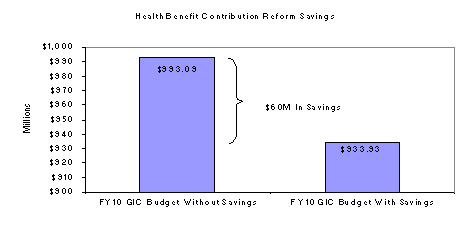Health Benefit Contribution Reform
[ index ]
 FY2010 House 1 Budget Recommendation:
FY2010 House 1 Budget Recommendation:
Policy Brief
Deval L. Patrick, Governor
Timothy P. Murray, Lt. Governor
Governor’s Proposal
Health care related costs are the largest and fastest growing component of the state budget. Cost containment must be addressed as the Commonwealth seeks to invest not only in health care, but education, environment, and other important areas.
According to the Kaiser Family Foundation and Health Research and Educational Trust 2008 Employer Health Benefits Survey, workers contribute on average 16% for individuals and 27% for families to their health coverage 1 . In Massachusetts, state employees' contributions are tied to date of hire, with most employees hired before June 30, 2003 contributing 15% to their health coverage and employees hired after that date contributing 20%.
While the Patrick-Murray Administration recognizes the importance of acknowledging state employees' commitment to public service, this is a generous benefit that cannot be sustained. Therefore, the Administration continues to support a more rational system based on salary levels and affordability rather than date of hire. This reform will improve both the fairness of the system and the Commonwealth's ability to continue to offer health benefits in the future. Reforming the system will generate more than $60 million in savings. Under Governor Patrick's proposal, state employees' contributions will be based on annual salary such that:
| Salary Level | Employee Contribution |
|---|---|
| less than $35,000 | 15% |
| $35,000 to $50,000 | 20% |
| morn than $50,000 | 25% |
Under the proposal, 6,400 employees earning less than $35,000 will see their premium contributions decrease, and 15,200 employees will see no contribution change. Approximately 60,000 employees will experience an increase in contribution including $25-$50 per month for individual plans or $60-$120 a month for families 2.

To achieve the same level of savings without reforming the system, the Group Insurance Commission would need to increase cost sharing requirements far in excess that might be proposed to address normally rising costs. For example, co-payments would need to double for most plans, increasing to $30 or more for primary care office visits and $600-$1,000 for inpatient care. This level of out-of-pocket spending would make the Commonwealth an outlier among employers who offer insurance. In 2008, the average co-payment for primary care among insured workers was $19 and, among individuals who pay a co-payment for inpatient care, the average co-payment was $219 3. The significant increases in patient cost sharing would impact the sickest enrollees who access care regularly.
Given the options for reducing employee health care costs, changing the employee contribution rates provides the most equitable proposal for reform. Tiering aligns the Commonwealth with levels of employer-sponsored health benefits in other sectors of our economy, and better positions the state to be able to continue to provide comprehensive health insurance to its workers.
1 Kaiser Family Foundation and the Health Research and Educational Trust, 2008 Employer Health Benefits Survey
2 Annual premium inflation that will occur regardless of changes to contribution ratios is not included in these estimates.
3 Kaiser Family Foundation and the Health Research and Educational Trust, 2008 Employer Health Benefits Survey
Prepared by the Executive Office for Administration and Finance · Rooms 373 & 272 · State House
For more information contact:
Ketav Patel (ketav.patel@state.ma.us)
www.mass.gov/budget/governor
 top of page
top of page
